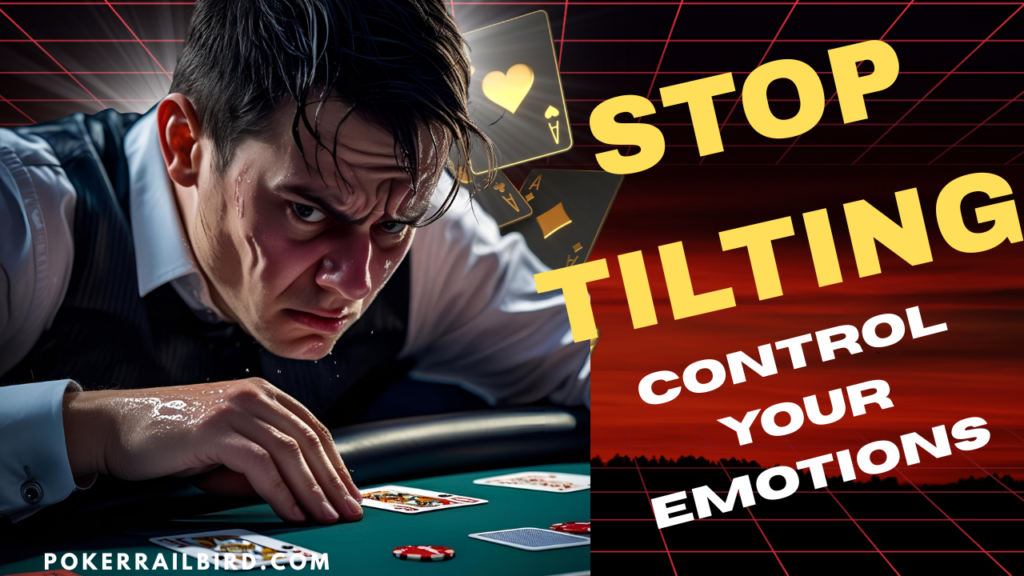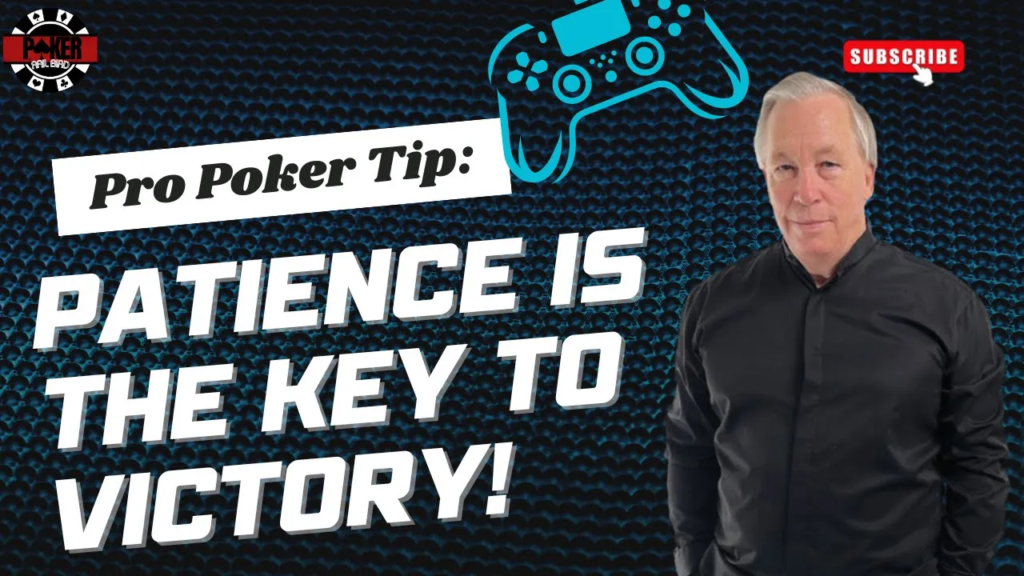YIELDING TO OUR EMOTIONS
DEADLY SIN NO. 5
Controlling Poker Emotions is not a slogan. It’s the line between steady profit and slow, invisible bleed.
Anger, ego, and “revenge” lines distort judgment. After a bad beat, risk feels cheaper and justice feels urgent. That’s how stacks disappear. Machismo pushes shot-taking, picking fights with the toughest player at the table, or playing bigger stakes than your bankroll allows. A different face of the same leak looks polite: skipping thin value to seem “generous.”
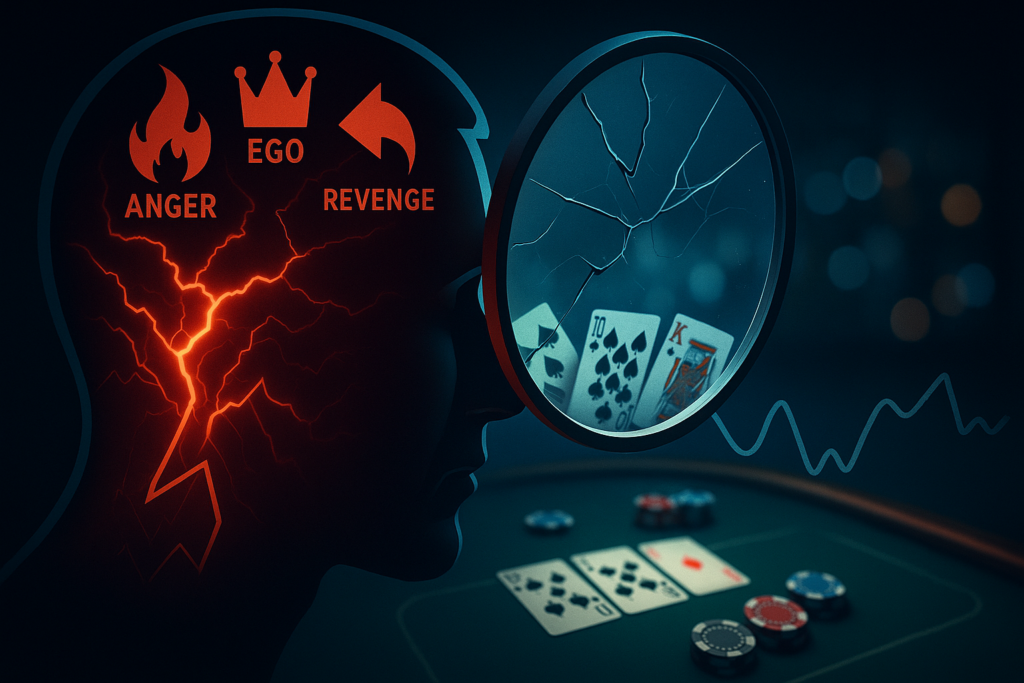
This sin is costly because it warps the inputs of decision-making. You start calling when you should fold. Or you raise to “send a message.” You chase losses instead of EV. The pattern is predictable: revenge after a bad beat, over-aggression, challenging better players, and the quiet generosity leaks on the rivers. Add decision fatigue, and even disciplined players slide.
In this piece, we’ll do two things. First, we’ll show why emotions bias risk—drawing on verifiable research from psychology and behavioral economics. Second, we’ll turn that science into table rules you can use tonight: how to pause, reset, and act with intent when the room tries to drag you into chaos.
YIELDING TO OUR EMOTIONS-WHY IT'S DEADLY
Controlling Poker Emotions or watching EV leak? This sin isn’t variance; it’s state-driven decision decay after emotional triggers. Anger shifts judgment: you feel more certain, see less risk, and act faster. That bias leads to wider calls, bigger “message” bets, and needless fights—classic tilt.
The pattern is predictable. A bad beat hits. You chase. Your horizon shrinks to the next pot. That loss-chasing turns small setbacks into session killers and shows up across gambling research—and in poker-specific tilt studies.
Bottom line: anger and ego don’t just feel loud; they systematically bias risk perception and action selection. If you don’t name the state and interrupt it, you won’t outplay it—you’ll fund it.
ANGER & MACHISMO: THE RISK ENGINE
Controlling Poker Emotions starts with understanding how anger and status affect your decision-making.
Anger tilts risk perception. In lab studies, angry people consistently judge risks as smaller and outcomes as more controllable, leading to risk-seeking choices. That’s the jump from disciplined lines to wider calls, faster raises, and “I’ll show you” pots right after a bad beat. The cards didn’t improve—your appraisal of risk shifted.
You see the same pattern when people feel a loss of control: anger spikes and becomes the bridge to more risk-taking. In other words, the very feeling that “this isn’t fair” nudges you toward the exact behavior that burns EV.
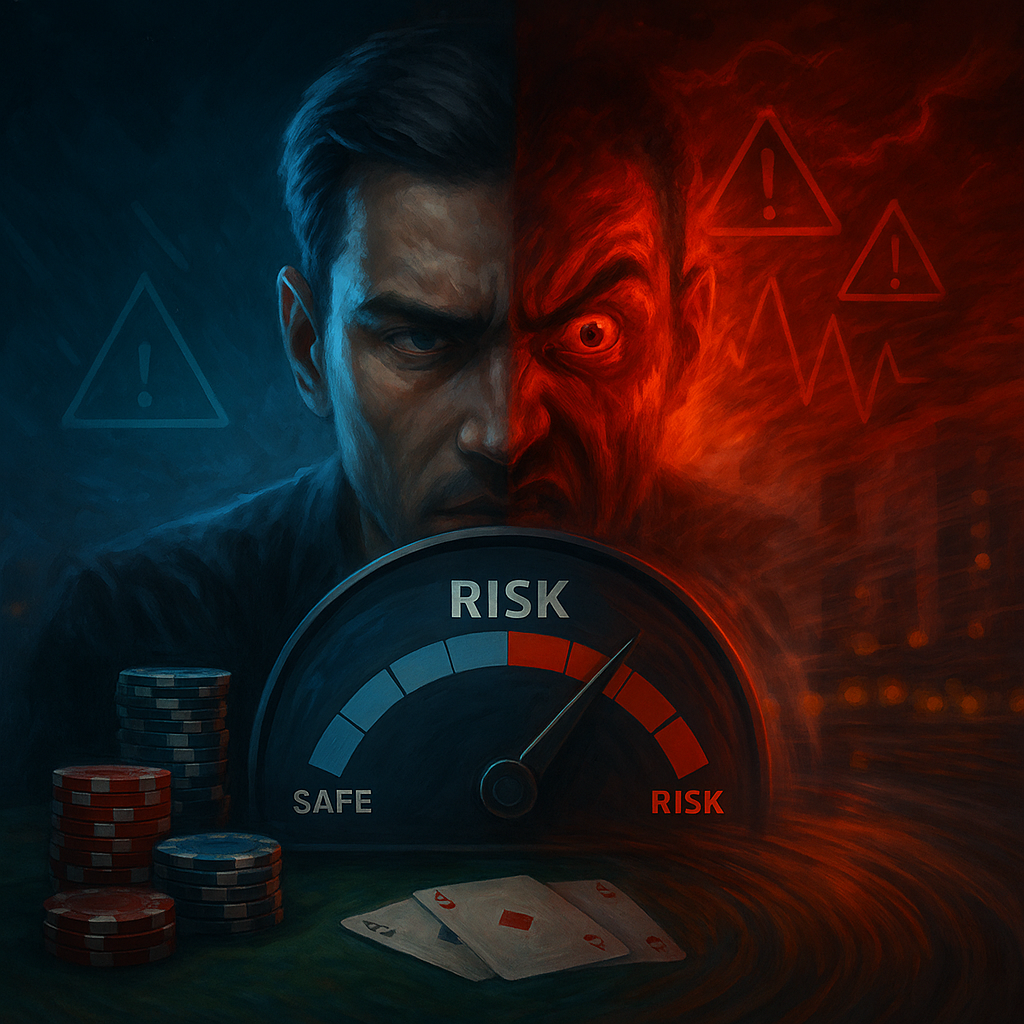
Machismo changes the opponent you choose and the stakes you chase. Testosterone and status cues are linked to challenge-seeking and competitive persistence—especially in contexts that signal hierarchy. Depending on context (and stress hormones like cortisol), higher testosterone can push men to enter competitions and pursue status-restoring contests, which at the table shows up as overplaying marginal spots, taking shots, and moving up stakes to prove a point.
Layer on the social piece: manhood is culturally treated as a precarious status that must be proved and re-proved in public. When status feels threatened, men are more likely to choose riskier, performative actions to signal toughness. Translate that to poker and you get vanity 3-bets, stubborn seat choices versus the room’s best player, and games that are too big for the bankroll—all story, no EV.
WHAT ACTUALLY BREAKS UNDER THESE STATES?
- Risk perception: danger feels smaller; “I’m due” feels real. PubMed
- Action selection: you widen ranges and pick fights you’d pass when calm. PMC
- Sizing logic: bets creep up to “send a message,” not to maximize EV.
- Time horizon: you chase the next pot instead of the session.
Practical translation at the table
- If you feel heat (anger) or pride (prove-it mode), assume your risk meter is biased. Use a hard pause and default sizings for the next orbit.
- Don’t “restore status” by moving up stakes or targeting the toughest reg. Status wants a duel; EV wants a soft seat.
The point isn’t to feel nothing—it’s to keep emotions from steering the decision tree. Name the state, narrow the range, stick to value-first lines, and let position and price—not pride—choose the hand.
REVENGE AFTER BAD BEATS (LOSS-CHASING)
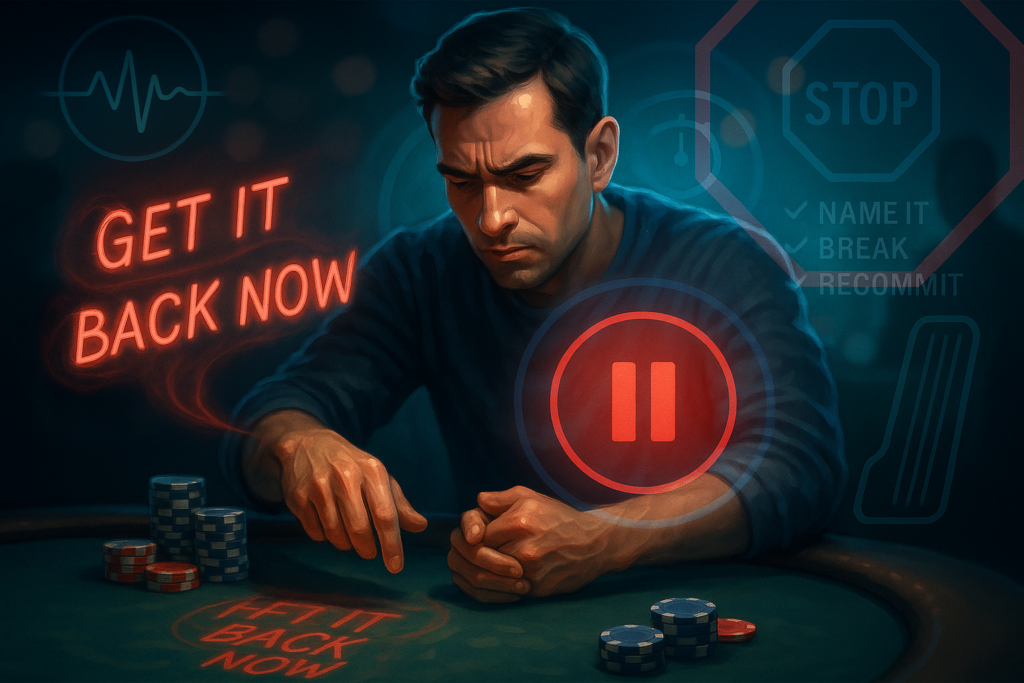
Controlling Poker Emotions means killing the most expensive reflex in poker: get it back now. That reflex has a name—tilt—and research treats it as a state-driven performance drop: emotions spike, judgment shifts, and your play degrades. In poker samples, the frequency of tilt episodes predicts worse outcomes and even problem-gambling risk.
Loss-chasing is the engine. After a painful loss, players continue or intensify gambling to recoup—bigger pots, thinner calls, faster clicks. It’s a well-documented pattern across gambling research and a core clinical feature of gambling disorder.
Why it burns EV is straightforward:
- Anger shrinks perceived risk. Under anger, people judge outcomes as more controllable and risks as smaller—so you widen ranges and fire “message” bets you’d pass when calm.
- Unfairness seeks payback. After being treated “unfairly,” many choose costly punishment over profit—think revenge lines at the table instead of EV.
- Fatigue amplifies tilt. Tired sessions show more emotional/behavioral tilt and worse financial results—exactly when players are likeliest to chase.
ANTI-CHASE PROTOCOL
- Name the state. Quietly label it: angry / proving a point. That snap of awareness breaks autopilot.
- One orbit off. Stand up, water, breathe. No decisions, no debates. (Fatigue compounds tilt—don’t feed it.)
- Re-commit your map. For two orbits: value-first, no range-widening, no “I’ll show you” barrels.
- Lock sizing. Use your default bet sizes; do not “pump it up” to punish.
- No stake-ups to get even. Stakes only change off-session, never inside the session. (Chasing up limits is textbook loss-chasing.)
Two fast self-checks catch most revenge leaks:
- Would calm-me take this line at this price? If not, fold now.
- Am I trying to win chips or win status? If it’s status, change seats/tables and reset.
Bad beats aren’t debts the game owes you—they’re variance funding future profit. The quickest way to turn one bad beat into a bad session is to chase. The fix is mechanical: pause, reset, and let EV—not emotion—choose the next hand.
Bad beats, suck-outs, and even the one-outer are not reasons to tilt. They are reasons to smile. Congratulate the player. Say “well played.” Why? First, variance is baked into poker. If you understand the math, you expect swings; you just don’t know when. Second, those “miracles” are proof you’re in a good game. If no one chased, if no one called against odds, poker would not be profitable. We profit because worse decisions continue. The chips went the wrong way this hand; over time, they flow to disciplined players who Control Poker Emotions and keep making +EV choices.
CHALLENGING THE ALPHA - A CAREFUL GENDER LENS
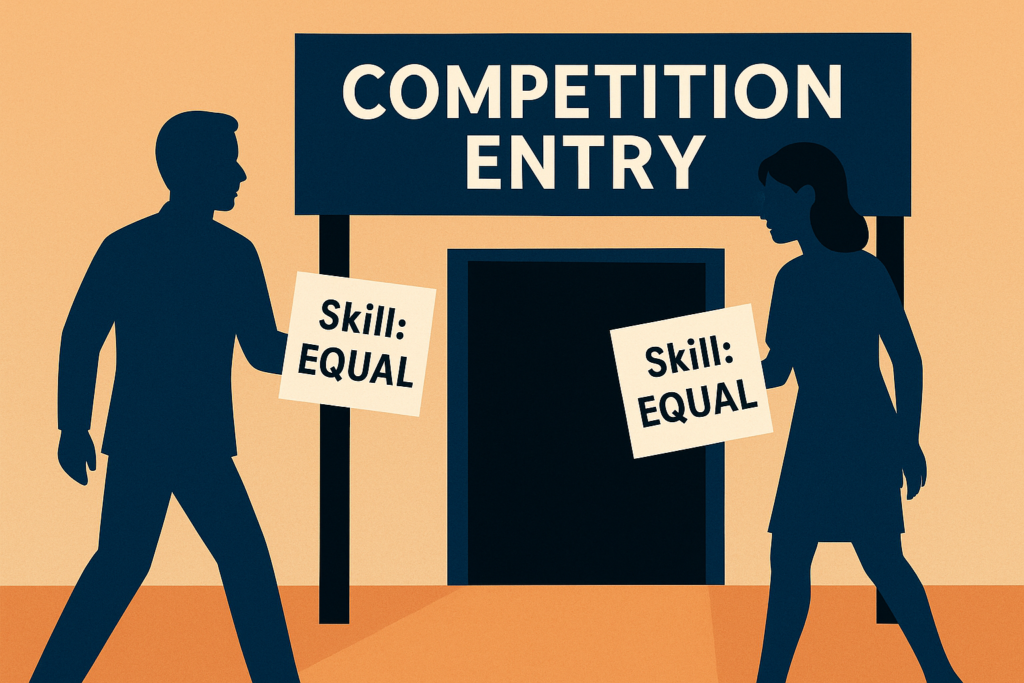
Controlling Poker Emotions also means controlling the quiet pull of status. In many contexts, men are more willing to enter competitions than equally capable women; the gap appears even when performance is the same. That’s the classic finding: men opt into tournaments roughly twice as often, despite no performance edge—an effect replicated across many lab tasks.
Meta-analyses show this isn’t a one-off. Across 100+ studies, men, on average, enter competitions more, with effect sizes that vary by setting and visibility (public vs private). The gap is context-sensitive—larger when status is on display.
Culture matters, too. In a famous field experiment comparing a patriarchal and a matrilineal society, the gender gap reversed in the matrilineal group: women competed more than men. Translation: the tendency to “take the challenge” is not ability-based and not universal; it’s shaped by norms and incentives.
Why does this map to poker? One relevant framework is precarious manhood: manhood is treated as a status that must be proven and protected, leading some men—when status feels threatened—to choose riskier, performative actions to restore it. At the table, that can look like picking fights with the strongest player, stubborn seat choices, or taking shots at bigger stakes to “prove it.” Those are status moves, not EV moves.
How to use this insight without stereotyping:
- Judge situations, not genders. When the room turns status-heavy (railbirds, loud pros, public image), expect more challenge-seeking—from anyone. Tighten up seat selection and pass on vanity 3-bets.
- Replace “prove-it” lines with aimed aggression: target the softest opponents, choose position over pride, and let the numbers—not identity—pick your battles.
Bottom line: the urge to challenge the alpha is often a status script. Recognize it, step off the stage, and choose the profitable seat instead.
THE "GENEROSITY" LEAK
Controlling Poker Emotions includes curbing the urge to look generous. Skipping a thin value bet to seem gracious feels good. At the table, it’s often status signaling—and it burns EV.
Humans sometimes use public generosity to signal quality. In evolutionary and social-psychology work, conspicuous helping functions as a costly signal that builds reputation and status within the group. In poker, that can translate into “I’ll check it back; I’m a good sport,” even when a small value bet is profitable.
The signaling motive can be sex-linked and context-dependent. Experiments show men increase generosity when observed by women, consistent with a mating/status display. That’s a nice story for courtship; it’s a bad one for river EV.
How to plug the leak (simple rules)
- Separate kindness from strategy. If you want to be generous, tip the dealer or donate after the session. In-hand, take the bet. Royal Society Publishing
- Pre-commit thin-value thresholds. Decide before you play what river spots you value-bet by default (board texture + position + action). Then follow the map.
- Neutral language. Don’t announce “I’ll be nice.” Bet, or check for EV reasons only.
- Reduce the audience effect. If the table turns performative, tighten to your defaults and ignore the social script.
- Track it. One missed thin bet per session compounds into real money. Log them for a week—you’ll stop leaking.
Bottom line: “looking generous” is a status move, not a strategy. Take the value you’ve earned, book the win, and keep your signaling for somewhere that isn’t priced in big blinds.
OUT OF GAS: FATIQUE, SELF-CONTROL, AND SESSION LENGTH
Controlling poker Emotions also means controlling time on task. Fatigue doesn’t just make you slow; it bends your choices. As decision load builds, people default to easier, lower-effort options and the quality of choices drops—what researchers call decision fatigue. In high-stakes settings, performance improves after breaks and degrades before them, a pattern shown in large decision sequences and consistent with mental energy effects.
Sleep and self-control load matter, too. Sleep loss blunts cognitive control and shifts people toward greater risk-taking, with changes tied to prefrontal systems that govern feedback and restraint. In short: tired brains chase, press, and justify.
The fix isn’t heroic grit; it’s structured recovery. A 2022 meta-analysis finds short micro-breaks reliably reduce fatigue and restore vigor, supporting brief resets to protect performance. You don’t need long timeouts—just planned, frequent, short ones.
THE SESSION STRUCTURE THAT PROTECTS EV
- Time-box your session. Set a hard stop and pre-schedule micro-breaks (stand, walk, water, 2–5 minutes). No in-hand decisions during the break.
- Orbit rule after a spike. After a bad beat or heat spike, take one full orbit off. Reset before you re-enter.
- Lock your map when tired. Late-session? Play value-first, stick to default sizings, and avoid thin multiway punts.
- No stake-ups to “get even.” Fatigue amplifies loss-chasing—do not change limits mid-session. (That’s classic loss-chasing.
- Hydrate, breathe, move. Tiny resets beat white-knuckle willpower. Consistency > intensity.
Bottom line: fatigue quietly rewires risk and restraint. Plan breaks, not battles. Protect your ranges and bet sizes when you’re tired, and let recovery—not emotion—steer the next decision.
STOP THE BLEED (CHECKLIST)
Print this, stick it in your card cap, and Controlling Poker Emotions in real time.
1) Name the state (out loud or silently to yourself).
angry / amped / proving a point → labeling breaks autopilot.
2) One-orbit timeout.
Stand up, water, breathe. No decisions for one orbit.
Rule: No stake-ups after losses. Limits only change off-session.
3) Re-enter on rails.
Pre-committed opening ranges and default bet sizes only.
No “revenge” lines. If a play isn’t in your calm map, it’s out.
4) Value-first for two orbits.
Bet real hands. No slow-plays. No “I’ll show you” barrels.
Don’t bluff into non-folders.
5) Seat and table hygiene.
If a rival is ego-hooking you, change seats or change tables.
Pick the profitable seat, not the status fight.
6) Thin-value discipline.
Take the bet now; be generous after the session (tip/donate).
No “nice” checks for the rail.
7) Micro-resets on demand.
Two deep breaths, relax shoulders, count to five before chips leave your stack.
If the clock is ticking in your head, fold more.
8) Two quick self-checks (every big decision).
- Would calm-me take this line at this price? If not, pass.
- Am I trying to win chips or win status? If status, step back.
9) Bad-beat reframing.
Smile, say “well played,” stack your chips. Variance funds profit.
Rejoice—they called. That means you’re in a good game.
10) End-of-session sanity.
Log one spot you skipped (or took) thin value, one ego trigger you avoided.
Small wins here compound into a bigger bankroll.
CLOSING THOUGHTS
Controlling Poker Emotions is a skill, not a slogan. It separates steady EV from slow bleed.
Anger and status warp risk. Loss-chasing shrinks your horizon. “Generosity” skips value. Fatigue lowers guardrails. None of that is variance; it’s preventable.
Use the protocol. Name the state. Take one orbit off. Re-enter on rails: pre-committed ranges, default sizings, value-first lines. Don’t bluff into non-folders. Don’t move up to get even. If a rival is ego-hooking you, change seats—or tables.
Reframe “bad beats.” They prove you’re in a good game. Thank the caller, breathe, and play the next hand by the numbers. Over time, chips flow to discipline.
The mission is simple: play the cards and the situation, not your mood. Leave pride at the cage. Protect your process. That’s how you turn chaos, tilt, and generosity theater into a larger bankroll—one decision at a time.

